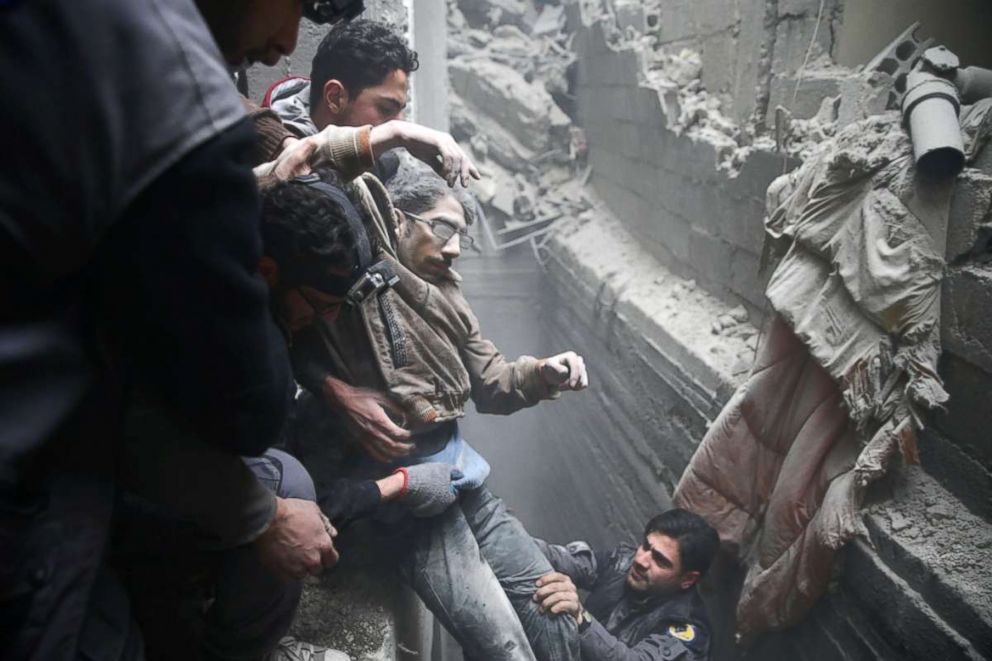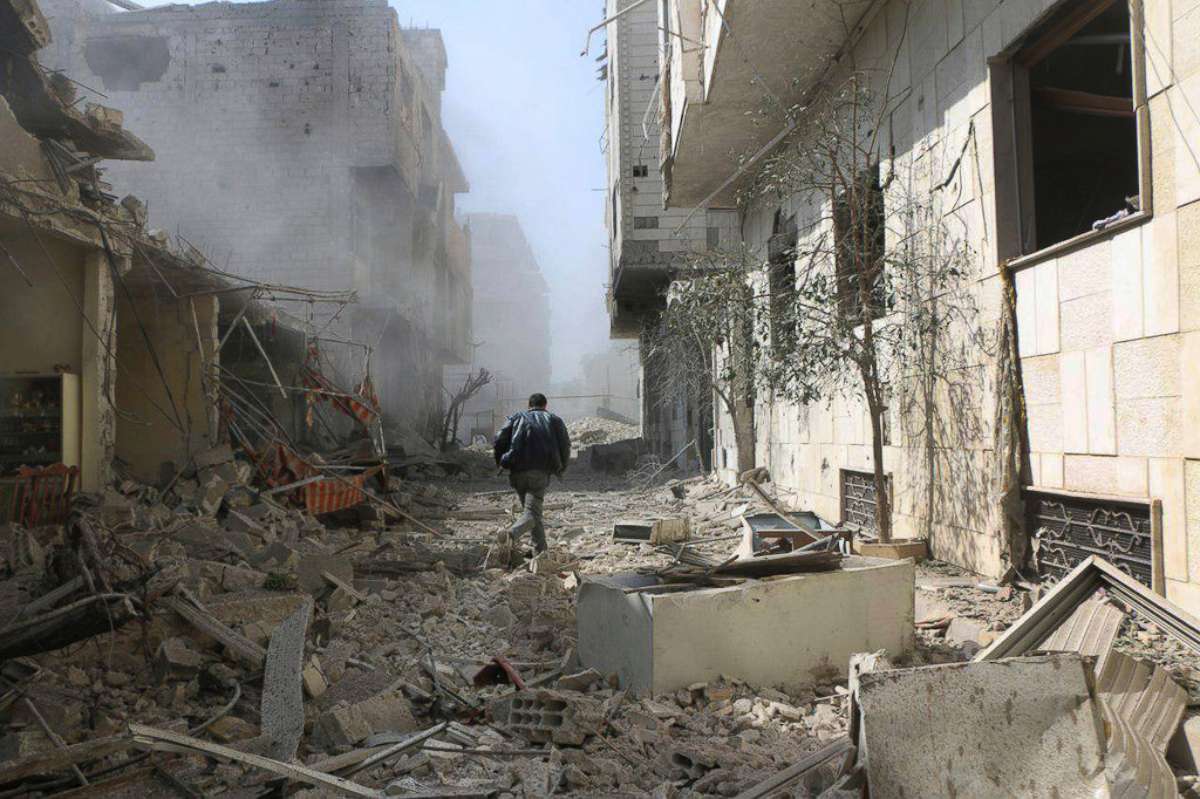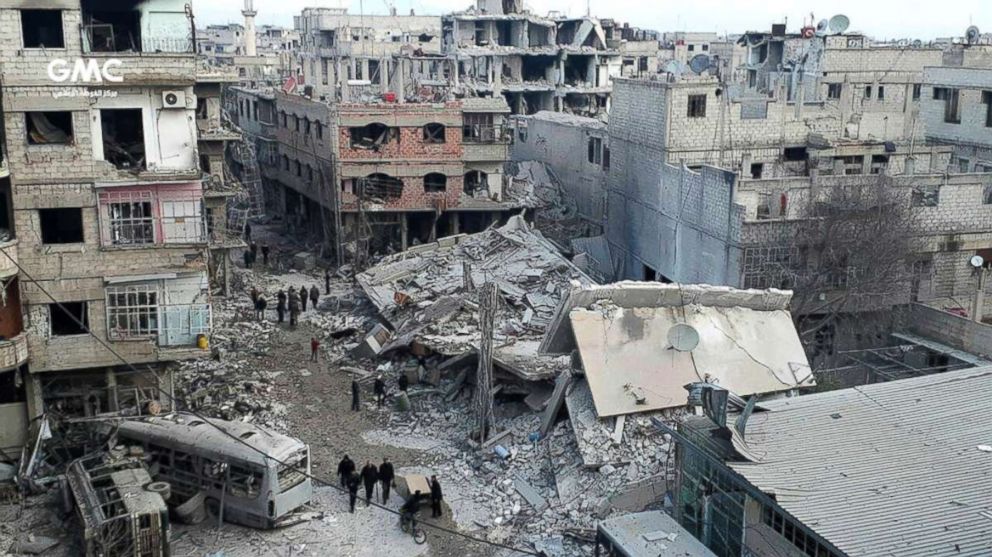'I see children in pieces': Attacks continue on besieged Damascus suburb
Since Sunday, at least 416 civilians, including 96 children, have been killed.
— LONDON -- After filming an airstrike on a hospital in rebel-held Eastern Ghouta, Syria, cameraman Diaa al-Din Samout checked on his uncle’s home next door. He found the building completely destroyed –- and worried that his 73-year-old grandmother, his 6-month pregnant aunt and her four children who were home, would not make it out alive.
“But there is fate because they were all only lightly wounded,” Samout told ABC News. Samout’s uncle Ahmad wasn’t home at the time of the attack in the town of Arbin on Tuesday, but he was nearby. Together, Samout and Ahmad pulled out the family while the camera captured the rescue. In the footage, two of the children emerged from under the rubble. Blood seeped down one of the children’s face as she screamed.
Samout's grandmother’s leg was broken before the attack, he said. “She couldn’t move and we pulled her out from under the rubble.”

This week in Eastern Ghouta is one of the deadliest the area has seen in years. Syrian forces and their Russian allies have pounded the besieged enclave, killing at least 416 civilians, including 96 children, since Sunday night, according to the Syrian Observatory for Human Rights, a U.K.-based monitoring group. The death toll is likely to rise because dozens remain under the rubble after the continuous bombardment, which has also left more than 2,000 injured.
In the town of Douma in Eastern Ghouta, Samira spent her morning trying to repair her apartment, which was damaged after a rocket was dropped on her street Wednesday night.
The impact of the attack blew away her windows and doors, she said. The main entrance to her building was damaged as well. She now uses a couch to keep it closed because it no longer locks.

“They are still shelling us,” Samira, who asked that her real name be withheld out of security concerns, told ABC News. “When the attacks intensify I hide in the living room, which is the safest place in my apartment because there are no windows.”
There is just one shelter in her neighborhood, she said, and it only has room for a small number of people – so she hides from the bombardment at home.
An estimated 400,000 people are trapped in Eastern Ghouta with little access to food, water, fuel, electricity and health care. More than 20 hospitals there have been attacked since Sunday night, according to the Syrian American Medical Society, which supports hospitals in Eastern Ghouta. Doctors in the enclave say they don’t have trauma drugs and surgical equipment, making it difficult, sometimes impossible, to save lives.

“We are currently only treating people with injuries from the shelling and most of them are children,” Amani Ballour, a pediatrician and hospital manager in Eastern Ghouta, told ABC News. “Sick people can’t make it to the hospital because of the intensity of the strikes.” She said her hospital received some 200 wounded and killed on Wednesday.
“I don’t know how to describe what I feel when I see children in pieces and dead bodies,” she said “We don’t know what to do.”
The United Nations Security Council met Thursday to discuss the situation in Eastern Ghouta at the request of Russia, president Bashar al-Assad’s main ally.
At the emergency meeting, Staffan de Mistura, the U.N. Special Envoy for Syria, called for a ceasefire.
“There is a need for avoiding a massacre, because we will be judged by history,” he said.
Russia’s U.N. ambassador Vassily Nebenzia, called the resolution unrealistic and proposed amendments.
The Syrian government and Russia say their military offensive against eastern Ghouta is necessary to overthrow rebels who have been firing mortars on Damascus. The recent surge in violence in Eastern Ghouta, which has been besieged by the Syrian government since 2013, is part of president Bashar al-Assad’s campaign to seize Syria’s last remaining opposition-held territories.




